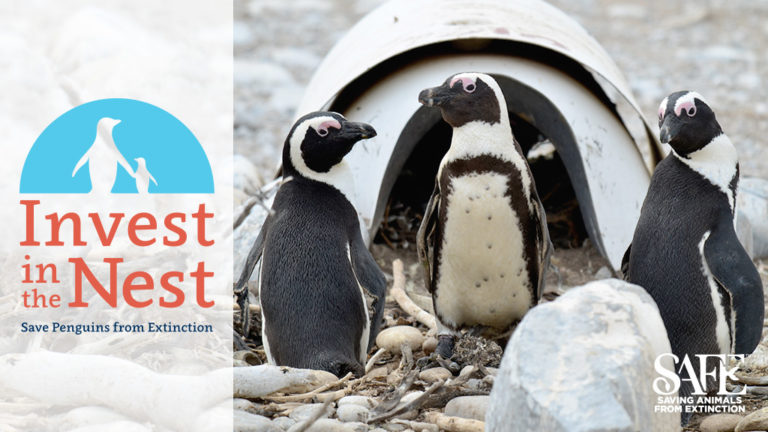Last year, Elmwood Park Zoo played a role in helping to promote the Kickstarter campaign, and to encourage our guests, volunteers, and staff to actively participate in the SAFE program for African penguins.
Excerpt taken from the September 2018 issue of “Connect” magazine:

African penguin populations have declined from more than one million to just 25,000 breeding pairs over the last century, due largely to human activity. The birds naturally nest in guano, but over-harvesting of guano for fertilizer has resulted in only about 27 natural nests being left. A lack of nests means a lack of protection for eggs, which are vulnerable to overheating on bare rock in the hot sun and increased predation. The SAFE: Saving Animals From Extinction African penguin program is working to address this threat and help save wild African penguins. Exactly one year ago, the Association of Zoos and Aquariums and the SAFE African penguin program launched an “Invest in the Nest” Kickstarter campaign to raise $150,000 in just 30 days to fund the creation and installation of artificial nests for penguin colonies in South Africa and Namibia. With the help of the zoo and aquarium community and thousands of generous Kickstarter backers from around the world, we surpassed our goal and our stretch goal, enabling AZA members to invest in more than 2,000 artificial nests.
Now, some of those nests are home to African penguins in the wild. This past fall, our team of scientists from Dallas Zoo and partners constructed the first 200 artificial nests for wild colony and durability testing. The artificial nests were specifically designed for temperature control and predator protection, and crafted individually by hand to give the penguins a home in which to raise their young. These nests, inanition to monitoring and security equipment, have been installed at two penguin colonies so far. Already, we’re seeing results. Just two weeks after the nests were installed, researchers shared that penguins at Bird Island had laid eggs in 65 percent of the nests in the Dyer Island colony also had eggs. The usage rate of the nests continues to climb as the breeding season progresses. Almost all of the nests (96%) have been occupied at some point following their installation.
What’s next? The SAFE African penguin program and partners will continue to collect and analyze the environmental data, and use these findings to further improve nest designs. We plan to build hundreds more nests, and in the long-term, have at least 6,000 artificial nests in penguin colonies to support the next generation of African penguins. But African penguins face multiple threats, all of which still need to be addressed. Through SAFE, AZA and partners are collaborating on additional research projects, including individual identification, health monitoring, disaster response, public engagement, and the African Penguin Species Survival Plan program.
Last year, Elmwood Park Zoo played a role in helping to promote the Kickstarter campaign, and to encourage our guests, volunteers, and staff to actively participate in the SAFE program for African penguins.

